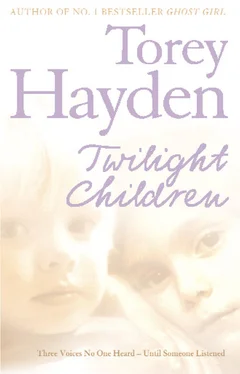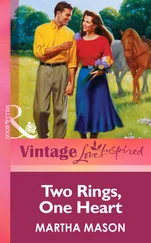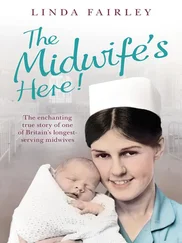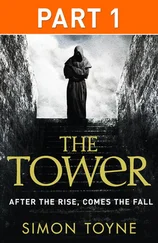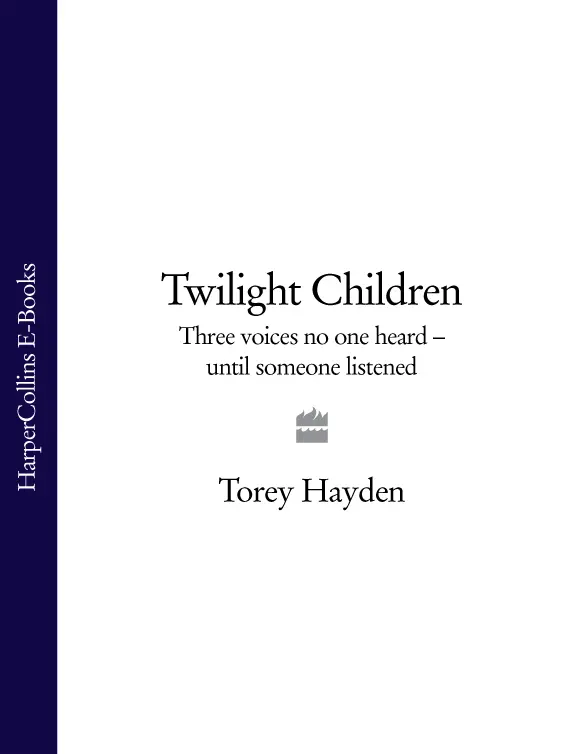
Torey Hayden
Twilight Children

Cover
Title Page Torey Hayden Twilight Children
Chapter One
Chapter Two
Chapter Three
Chapter Four
Chapter Five
Chapter Six
Chapter Seven
Chapter Eight
Chapter Nine
Chapter Ten
Chapter Eleven
Chapter Twelve
Chapter Thirteen
Chapter Fourteen
Chapter Fifteen
Chapter Sixteen
Chapter Seventeen
Chapter Eighteen
Chapter Nineteen
Chapter Twenty
Chapter Twenty-One
Chapter Twenty-Two
Chapter Twenty-Three
Chapter Twenty-Four
Chapter Twenty-Five
Chapter Twenty-Six
Chapter Twenty-Seven
Chapter Twenty-Eight
Chapter Twenty-Nine
Chapter Thirty
Chapter Thirty-One
Chapter Thirty-Two
Chapter Thirty-Three
Chapter Thirty-Four
Chapter Thirty-Five
Chapter Thirty-Six
Chapter Thirty-Seven
Chapter Thirty-Eight
Epilogue
Also by the Author
Copyright
About the Publisher
This book is based on the author’s experiences. In order to protect privacy, names, some identifying characteristics, dialogue, and details have been changed or reconstructed. Some characters are not based on any one person but are composite characters.
She was a small, fine-boned girl with a pointed pixie chin and unusually distinct cheekbones. Her hair was a soft black, straight and shoulder length, but it had been rather raffishly cut, as if perhaps done by another child. Her eyes, however, defined her face. Enormous, protruding slightly, and fluidly dark, like shadowed water, they overpowered her other features. She wasn’t what I would call a pretty girl, but she was striking in a faintly unreal way, so that when she lifted her hand to push hair back from her face, I half expected to see elfin ears.
“Hello,” I said and pulled out the chair at the table.
She hunched forward, hands down between her knees so that her chin was almost on the tabletop. Her eyes, however, remained on me. She smiled in a manner that was rather self-conscious, yet friendly enough.
“What’s your name?” I asked.
“Cassandra.”
Ah, a mythical name. It fit the fairy-tale looks.
“How old you are, Cassandra?”
“Nine.”
“My name’s Torey, and you and I are going to be working together each day.” I pulled out a chair adjacent to hers and sat down. “Can you tell me why you’ve come to the unit?”
Her dark eyes locked on mine, and for a moment or two she stared intently, as if she expected to find the answer there. Then she shook her head faintly. “No.”
“What about your mom? What did she tell you about why you were coming here?”
“I don’t remember.”
“Okay,” I said. I bent down and opened my box of materials. Taking out plain paper and a smaller cardboard box, I laid them on the table. “Most of the children I work with come to the unit because they have problems that make them feel bad. Sometimes, for example, they have problems in their family. Maybe someone in the family is really unhappy and it makes them do hurtful things. Maybe there’s been a divorce. Maybe there’s lots of fighting at home. For some of the children who come here, it’s other things. Maybe they’ve been in an accident or a really scary situation, or they’ve been very ill. Some have been treated or touched in a way that felt wrong, or people tried to make them keep secrets that hurt. And sometimes … sometimes kids don’t even know the reason they have troubles. They just feel angry or worried or scared all the time. So these are some of the reasons children come to the unit.”
Cassandra watched me with unusual intensity, as if she were really trying to take in what I was saying, trying to absorb it, almost. Nonetheless, there was an oddly blank quality to her stare, almost as if she were listening so carefully not for the content of what I was saying but rather because I was speaking to her in a foreign language she didn’t quite understand.
“Hearing about reasons for other children coming to the unit,” I said, “do you think any of those describe you?”
“I don’t know.”
“Okay. Well, I’ll share with you some of the things other people have told me about you. You can then say if you think they are true or not.
“Your mom, for instance, tells me that you had a scary thing happen to you when you were five. She says that she is divorced from your dad and that you and your sister were supposed to live with her and not see him. Then one day your dad came to school and had you get into his car, even though that was against the rules. He drove off with you and wouldn’t bring you back, and he wouldn’t phone your mom to tell her that you were safe, and he wouldn’t let you phone your mom. She says you were gone a long time – about two years – and during the time you were with your dad, some very scary things happened to you. Is that right?”
Cassandra nodded. Her demeanor was pleasant, cheerful even, as if I’d said no more than “Your mom says you are in third grade.”
“Your teacher tells me that you like school, that you can be very enthusiastic about what is happening in class. She says you are quite a smart girl and can do really well sometimes.”
Cassandra smiled.
“But she also tells me that at other times you have lots of problems. You can get very angry and have a hard time following the rules. Occasionally when you are at school, you get very upset and then you stop talking. Mrs. Baker says there are sometimes days and days when you don’t want to say anything to anyone, and this makes it difficult to do your work in class. But she tells me while these are bad problems, they aren’t the biggest problem. She says the biggest problem is that you very often don’t tell the truth. You make up stories about people that get them into trouble, and you often talk about things that aren’t really happening at all.”
I paused. “What do you think? Do you think these things have caused trouble for you?”
Cassandra shrugged. It came off as almost a comical gesture, the way she did it. She brought her shoulders way up and rolled her eyes in an exaggerated fashion that was tinged with tolerant good humor, as if to say, “Silly grown-ups, who make mountains out of molehills.”
“These are the reasons the grown-ups have given me, when I asked, ‘Why is Cassandra Ventura on the unit?’”
Cassandra rolled her eyes again, then looked up to the right, then up to the left, then back to the right.
“What do you think?” I asked. “Do these things seem like problems to you?”
“I don’t know.”
“I’m interested in your thoughts. There isn’t a wrong or right answer to my questions. We’re just exploring.”
“I don’t know,” she repeated.
“You don’t know?”
“I don’t remember.”
“You don’t remember what? If you do those things? If people think those are problems? Or you don’t remember what I just said?”
Again she shrugged and rolled her eyes.
I pushed one of the plain pieces of paper in front of Cassandra, then I opened the small box. Inside was an assortment of marking pens, pencils, and crayons. “I want you to draw me a picture of your family.”
Читать дальше
